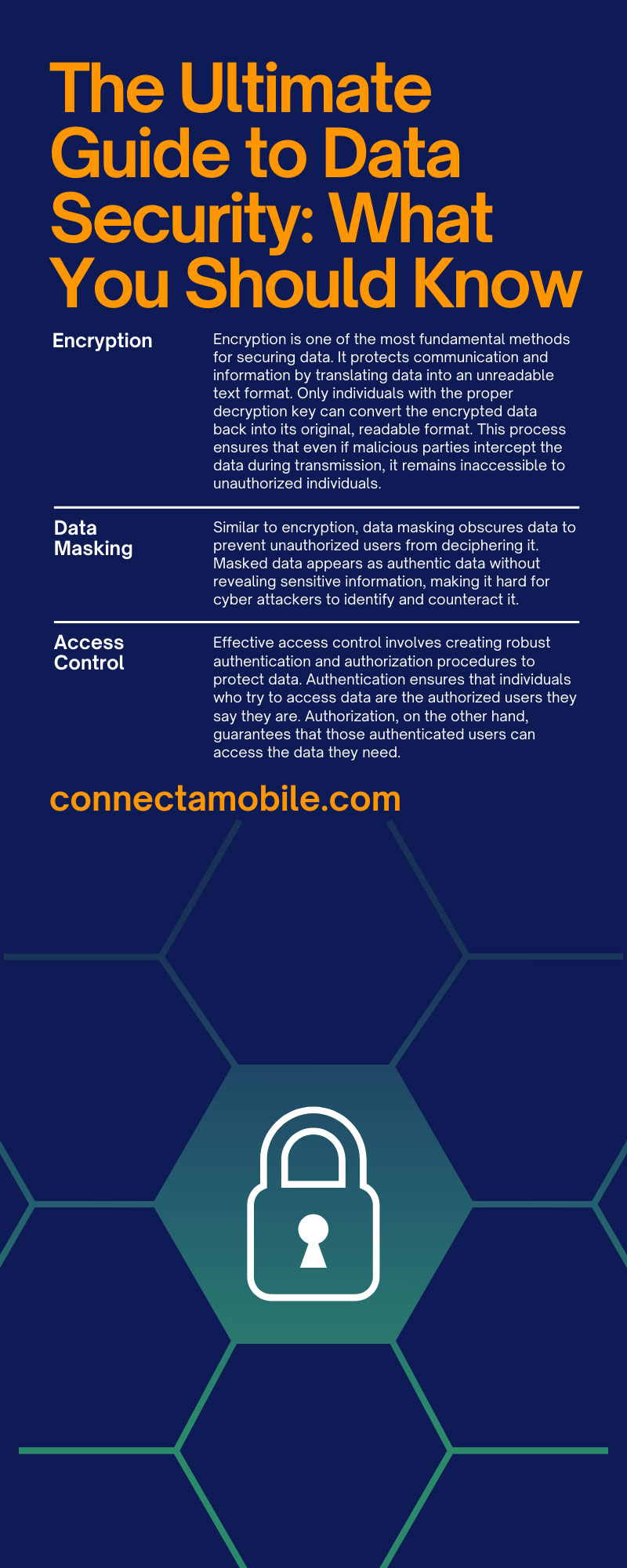Understanding data security is not just important—it’s essential. For businesses and organizations of all sizes, safeguarding digital information has become a top priority. With the increasing frequency of cyber threats, protecting sensitive data is crucial to maintaining trust, ensuring legal compliance, and securing the longevity of an enterprise.
By understanding the ins and outs of data security, organizations can protect themselves and their clients from loss and create safer, more dependable operations. Discover everything you should know about data security—including why it’s important and how businesses can improve their own security practices—with this ultimate guide.
Defining Data Security
Data security refers to the practice of protecting digital information from unauthorized access, corruption, or theft throughout its life cycle. It encompasses a wide range of measures, from physical security controls and administrative policies to technical safeguards like encryption and access controls.
The core principles of data security revolve around maintaining the confidentiality, integrity, and availability of data. Confidentiality ensures that information remains private and is accessible only to those authorized to view it. Integrity guarantees that data remains accurate, unaltered, and uncompromised. Availability ensures that data is accessible to authorized users whenever they need it, which in turn enables smooth and efficient data usage.
By adhering to these principles, organizations can create a robust framework to protect their sensitive information against various threats.
The Importance of Data Security
Safeguarding information has always been important. It’s why businesses hide certain recipes or technologies, or why people protect their social security cards and other personal documents. Protecting data becomes more complicated in a digital environment, but it’s just as important as it has always been.
Data loss, theft, and alteration have far-reaching consequences for businesses and individuals alike. Data breaches can result in financial losses, legal penalties, and reputational damage, not to mention the potential harm to individuals whose personal information is involved in the attack.
Ensuring robust data security measures helps prevent these breaches, safeguarding confidential information from malicious attacks and accidental leaks. Furthermore, strong data security practices build customer trust, as clients are more likely to engage with organizations that prioritize the protection of their personal information.
Types of Data Breaches
Data breaches are some of the most significant threats to digital security, and they can occur in various forms. Accidental leaks, for example, happen when human error or system malfunctions inadvertently expose sensitive information. Phishing attacks are another common type of breach, where attackers deceive individuals into providing confidential information through fraudulent emails or websites.
Lack of effective access controls, such as strong passwords or multi-factor authentication, can also lead to breaches. When you have weak access procedures, it’s easier for unauthorized individuals to gain entry to your private data.
Each type of data breach operates differently, but the damage they cause can be substantial, ranging from financial losses to the erosion of trust and legal repercussions. Understanding these threats is the first step in developing effective strategies to mitigate them and protect your organization’s data.
Secure Data Ensures Compliance
Regulatory compliance is a substantial part of what organizations should know about data security. Businesses and other organizations must adhere to specific laws and regulations to ensure they are meeting data compliance standards and effectively protecting sensitive information. These policies can vary depending on the industry and local, state, or federal government laws, but they all aim to ensure the safe handling and storage of data.
Common data security regulations include the Health Insurance Portability and Accountability Act (HIPAA), the Payment Card Industry Data Security Standard (PCI DSS), and the Federal Information Security Modernization Act of 2014. These regulations provide rules for various entities to adhere to so they can protect customers, employees, and assets.
Failing to meet these standards can result in hefty fines, legal action, and significant damage to an organization’s credibility. By implementing robust data security measures and staying up to date with regulatory requirements, businesses can foster a culture of security that protects both their assets and their clients’ trust.
Different Data Security Methods
Different types of organizations and data call for different data security technologies and practices. If companies want to create robust security systems, they need to understand and utilize various security protocols. This approach not only helps in protecting valuable information but also ensures compliance with regulatory standards. Below are some of the most common and effective data security methods that can help keep data safe from unauthorized access and breaches.
Encryption
Encryption is one of the most fundamental methods for securing data. It protects communication and information by translating data into an unreadable text format. Only individuals with the proper decryption key can convert the encrypted data back into its original, readable format. This process ensures that even if malicious parties intercept the data during transmission, it remains inaccessible to unauthorized individuals.
Encryption processes provide a high level of security for sensitive information, making it ideal for protecting everything from personal communications to financial transactions. Encryption also helps meet compliance requirements for data protection laws, adding an extra layer of credibility and trustworthiness to your organization. Implementing strong encryption protocols—including the use of encrypted communication devices—is a must for any business serious about data security.
Data Masking
Similar to encryption, data masking obscures data to prevent unauthorized users from deciphering it. Masked data appears as authentic data without revealing sensitive information, making it hard for cyber attackers to identify and counteract it.
Data masking not only helps in securing data but also maintains the usability of the data for testing and analysis purposes. This makes it particularly useful in non-production environments, such as testing or development, where real data is not required.
Access Control
Effective access control involves creating robust authentication and authorization procedures to protect data. Authentication ensures that individuals who try to access data are the authorized users they say they are. Authorization, on the other hand, guarantees that those authenticated users can access the data they need.
Access control is not just about keeping intruders out; it’s also about managing internal access to ensure data integrity and confidentiality. By ensuring that only the right people have access to the right data, organizations can significantly enhance their security systems and ensure smoother, safer operations.
Implementing strong access control measures is essential for safeguarding sensitive information. This includes using multi-factor authentication, enforcing good password habits like minimum character lengths and routine password updates, and performing regular audits of access permissions. These measures help minimize the risk of unauthorized access and data breaches.
Data Backup
Data backup is another crucial safeguard to prevent data loss or corruption. It ensures that you still have access to your information even in the event of a data breach or system failure. Creating secure copies of your data can save your organization from the devastating effects of data loss. This includes everything from accidental deletions to ransomware attacks. By maintaining up-to-date backups, you can quickly restore your data and resume normal operations with minimal disruption.
Connecta Mobile helps businesses and other organizations establish robust data security practices to protect their information, communication, and more. Explore cutting-edge privacy solutions when you partner with Connecta Mobile today.

